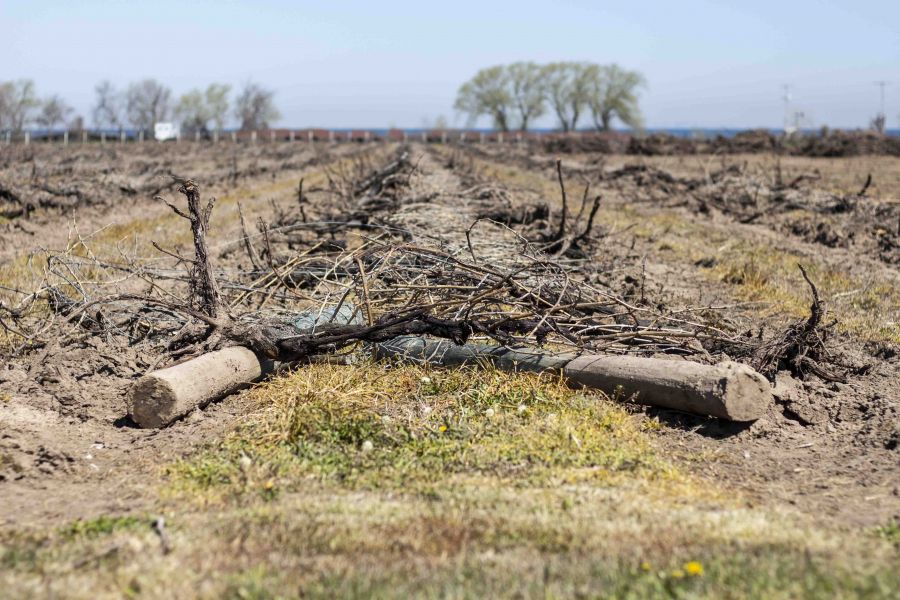Consumers urged to 'buy local' now to help the industry recover
Grape farmers in Niagara-on-the-Lake are facing the same trying times as everybody else amid the pandemic and some growers' contracts with wineries have not been renewed.
Matthias Oppenlander, chair of Grape Growers Ontario, said there’s been a lot of uncertainty in the grape business, some of which started before COVID-19.
But the pandemic has added new stress to the situation.
“I know two or three (wineries) that have absolutely no sales right now. That had happened before COVID-19, for whatever reason we’re not sure, we’re trying to get to the bottom of this. And then COVID-19 obviously exasperated the bottom line, so there’s a little bit of uncertainty in the market for sure.”
Several grape growers contacted by The Lake Report declined to talk about the situation, citing fears of “retaliation” and further cuts.
For the last two years, long before the pandemic, there has been a concern as to how the provincial government’s new alcohol sales plan will affect the wine industry, Oppenlander said, and wineries are taking active measures, like by cutting grape contracts, to make sure they don’t have too much stock.
The province's review, launched in 2018, looked at rules for how beer, cider, wine and spirits are sold and consumed, allowing sales in corner stores and grocery stores, and creating more opportunities for private sector sellers and distributors.
“Obviously there’s concern. There was concern before, really, because we’ve had the alcohol and beverage review, so we don’t know how that’s going to shake out for the Ontario industry,” Oppenlander said.
He said some of the issues with sales are how many imported wines will be allowed versus Ontario-made wines.
“We’re hoping that through that review that Ontario will be able to get its fair share in the marketplace. Obviously that has been pushed to the back burner right now by the government because of COVID-19.”
Meanwhile, some yearly growing contracts were “cut back” or didn’t get renewed in January or February, Oppenlander said.
COVID-19 has added new stress to the situation, by delaying implementation of new regulations and severely affecting sales, he said. Winery retail stores have been closed and online sales have been the sole major source of revenue. There are also serious concerns about the 2020 tourist season.
“We’re not sure where the tourist season is going to go,” he said. “If wines sales go down, obviously that directly relates to grape purchases.”
The uncertainty has caused grape processors to be cautious and reduce grape orders.
“Most of the processors, whether it’s a small winery or larger winery, they’re all concerned that they won’t have the wine sales, right? And obviously wine sales translate directly to grape purchases,” Oppenlander said.
He said he’s not sure if online wine sales are going to be enough to support the wineries.
Oppenlander, who owns Huebel Grapes Estates on Line 3 Road in Virgil, said he’s “not quite sure” how badly his own farm will be affected.
“We’ve got some of our tonnage that’s been reduced a bit. We’re hoping that sales don’t drop too much so that it doesn’t have to be taken any further,” he said.
“We’re all a little anxious because, like I said, we don’t know what’s going to happen out of this crisis. Are we going to come out of this in late spring or early summer? Is there going to be a tourist season at all? So that could all affect it.”
He said he’s hopeful for a solution.
“It’s troublesome on both parts, for the processors and the grape growers. Somehow we hope that we come up with a strategy to get through this together, with the government as well.”
Part of that solution, he said, is making sure you buy local now.
“If people start drinking local, looking for the VQA, and locally produced wine, that would ultimately help us, help the wineries and help the grape growers at the end of the day,” he said.
Part of them problem if growers lose contracts, is that the crop still needs to be tended, otherwise the vines can be adversely affected.
“Unfortunately vineyards are perennial crops, you’ve gotta maintain them. You’ve gotta prune them, tie them and take care of them for a year. You have to input costs, so I guess they’ll work and see and hope for the best. That’s all you can do, you can’t just take them out. It takes seven years to get a vineyard into production. Well, it takes three years to get the first crop, but it's seven years till you really reach the full crop,” Oppenlander said.
“Just like the orchards, you’ve just got to maintain.”
He said local support has been up lately and he’s hopeful it will continue and wine sales will be strong.
“We’re hoping that sales stay strong, we’re hoping that local gets supported, and at the end of the day that will get us through this,” he said.
Some smaller wineries have retooled and now do a lot of online sales “and the consumer has responded well,” he said. ” Hopefully they keep on doing this.”
“Coming out of this pandemic, we realize supporting local will help everybody,” he said. “Because every local bottle of wine, VQA bottle of wine, that we sell helps the great cause, helps the economy. I think it’s something like, we sell a bottle of wine, the economic spin off is like $98, which is huge.”











